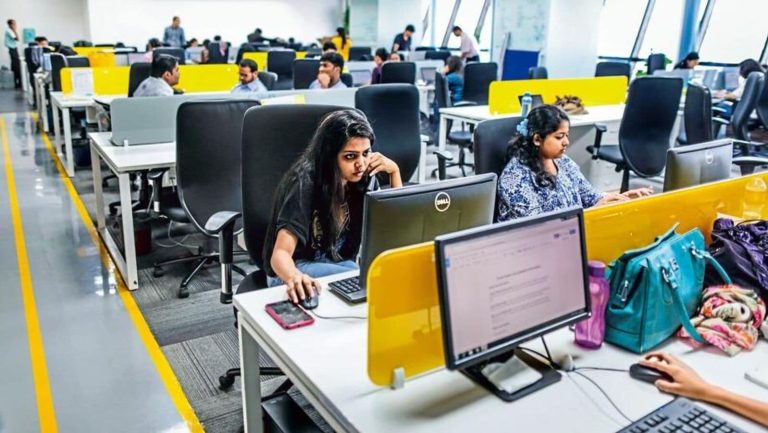Monday’s economic survey highlighted the negative impact that artificial intelligence can have on India’s working class, which in turn can add obstacles to sustained growth of the Indian economy.
The survey, presented by Finance Minister Nirmala Sitharaman in the Lok Sabha, highlights the private sector to find ways to augment the workforce with the help of AI rather than displacing jobs.
“The advent of artificial intelligence casts a huge pall of uncertainty about its impact on workers across all skill levels – low, medium and high,” the survey said, highlighting it as one of the potential shocks that can further structurally hamper job creation and create barriers and impediments to sustained high growth rates for India in the years and decades to come.
Other shocks could include climate change and global warming, the survey said, while noting larger shocks from high corporate debt and the Covid pandemic that have dampened job creation.
The Economic Survey also noted that with the impact of artificial intelligence on several areas of economic activity, the labor market will have to adapt and direct technological choices towards collective well-being.
“Overcoming these barriers requires a broad alliance between state and union governments and the private sector,” the survey said. “The business sector has a responsibility, both to itself and to society, to think more seriously about how AI will enhance the workforce rather than replace it,” it added.
At the press conference, Chief Economic Advisor V. Anantha Nageswaran said that India needs to create about 8 million jobs every year and in this context, Indian companies need to ensure that the deployment of technology does not hurt the labour share of income and the capital share of income. This, he said, was a medium-term challenge.
“India could have a slight negative impact in the short term followed by a positive impact in the medium term. So, there is a need for the Indian corporate sector, both IT and the entire IT sector, to strike the right balance between technology deployment and workforce deployment because without labour income and employment, there is no demand growth, which means it also hurts the country’s top line and bottom line,” he said.
Referring to the findings of the International Monetary Fund staff discussion note published in June 2024 that raise deep concerns arising from generative artificial intelligence or The impact of GenAI On massive job market disruptions and inequality, the survey said it would be in the “self-interest” of Indian companies to seriously create jobs while investing in AI across sectors.
“…employment is about dignity, self-worth, self-esteem, self-respect and status in the family and community, not just about income. That is why it is in the enlightened interest of the Indian corporate sector, which is swimming in excessive profits, to take seriously its responsibility to create jobs. Of course, it has to find people with the right attitude and skills,” he added.
Impact of AI on the service sector
The study says AI is likely to limit growth opportunities in business services, which could pose a major challenge to job creation and the long-term sustainability of the services sector in India. It says functional cities are necessary for the growth of services, especially those with more global market potential.
Highlighting the low hiring rate in the IT sector over the past two years and a blurry picture of overall hiring by companies on a regular basis, the survey warns against indiscriminate deployment of capital- and energy-intensive AI, which, in turn, will hurt job creation.
“We don’t have a comprehensive view of all the hiring going on in companies across the country on a regular basis. In any case, deploying capital- and energy-intensive AI is probably one of the last things a growing lower-middle-income economy needs,” he added.
Calling the technology an emerging strategic differentiator that is critical to the economic prosperity of nations, the study acknowledges that AI has immense potential to improve productivity, but its social impact through labor market disruption and workforce displacement is not yet understood. “It also has the potential to distort the income shares of capital and labor in favor of the former,” it notes.
Catch all theBudget News,Economic news, Economic news,latest newsEvents andLatest news Updates on Live Mint. Download theMint News App to get daily market updates.
MoreLess


